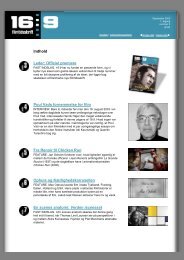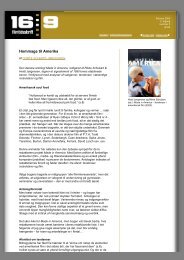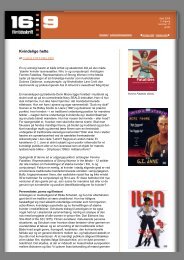Create successful ePaper yourself
Turn your PDF publications into a flip-book with our unique Google optimized e-Paper software.
Forside Indhold Arkiv Abonnement Profil Links Kontakt English<br />
<strong>16</strong>:9 in English: The Biography of Great Men – The<br />
Political Biopic in America<br />
By ANDREAS HALSKOV<br />
A genre firmly rooted in the genre system of Hollywood, the<br />
biopic is not only alive today, but ‘alive and kicking’. Films like<br />
Phyllida Lloyd’s The Irony Lady (2011), starring Meryl Streep,<br />
Simon Curtis’ My Week with Marilyn (2011) and Clint<br />
Eastwood’s J. Edgar (2011) all attest to the popularity of the<br />
biographical film. A subgenre of the biopic is the political<br />
biopic, a subgenre which has often been neglected in Denmark,<br />
but which has always been a stronghold in the US. In this<br />
article, I shall give a brief historical overview of this subgenre<br />
in American cinema, explaining how its success is related not<br />
only to Hollywood’s star system, but also to a personalized<br />
political history often connected to the US.<br />
The Scottish historian, critic and author Thomas Carlyle (fig. 4) has<br />
famously said that ”The history of the world is but the biography of<br />
great men,” pointing to a personalized conception of history which has<br />
often been debated and largely disavowed.<br />
This particular view, however, is suitable when trying to explain the<br />
success of the political biopic in the US, where presidents are often the<br />
stuff that tales and films are based on. The so-called “founding<br />
fathers”, with whom most Americans are acquainted, have been<br />
fictionalized in the biographical miniseries American Lives (PBS, 1997)<br />
and HBO’s John Adams (2008), starring Paul Giamatti; Abraham<br />
Lincoln has been depicted many times over, most popularly in the<br />
eponymous film by D.W. Griffith (1930) and John Ford’s The Young Mr.<br />
Lincoln (1939); Franklin Delano Roosevelt is central to a miniseries<br />
from 1965, starring Charlton Heston; Harry S. Truman is played by<br />
Gary Sinise in the telefilm Truman (HBO, 1995); John F. Kennedy’s<br />
tragically short life has often been investigated and depicted, most<br />
recently in the miniseries The Kennedys (History Channel, 2011-) in<br />
which he is played by Greg Kinnear; Richard Nixon is the ‘tragic hero’<br />
or ‘crook’ in Oliver Stone’s film from 1996 and part of Ron Howard’s<br />
critically acclaimed film Frost/Nixon (2008); Ronald Reagan is played<br />
by James Brolin in The Reagans (CBS, 2003) and George W. Bush has<br />
recently been played by James’ son Josh Brolin in the slightly satirical<br />
film W (2008) by aforementioned Oliver Stone.<br />
Focusing specifically on the two Lincoln films (Griffith 1930 and Ford<br />
1939) and the two films on Nixon (Stone 1996 and Howard 2008), I<br />
shall try to describe the typical features in political biopics and, at the<br />
same time, explain why this particular subgenre is so popular in<br />
America, yet almost unnoticeable in Denmark (1).<br />
Fig. 1-3: ”The return of the real”: Biopics<br />
are flooding the market these days, and<br />
within the last four years political biopics<br />
have been made on such diverse political<br />
figures as John Adams (HBO, 2008),<br />
Margaret Thatcher (The Iron Lady, 2011)<br />
and J. Edgar Hoover (J. Edgar,2011).<br />
1) Granted, there are films in Denmark –<br />
even if they are few are far between –<br />
which can be seen as political biopics. The<br />
film AFR (2007) could in a sense be<br />
construed as a biopic about Anders Fogh<br />
Rasmussen, former Prime Minister of<br />
Denmark, but is more accurately described<br />
as a mockumentary. En kongelig affære<br />
(2012, A Royal Affair) by Nikolaj Arcel,<br />
however, is a biopic about Christian VII, a<br />
former Danish king, but also about J.F.<br />
Struensee as a <strong>som</strong>ewhat dubious<br />
politician.<br />
Jens Otto Kragh, the most obvious choice<br />
for a political biopic in Denmark, is seen<br />
(although not as a central character) in the<br />
drama series Krøniken (DR, 2004-2007),<br />
and both a political biography and a<br />
biographical stage play have been made<br />
about his life (as a politician and a private<br />
person).<br />
Fig. 8-9: Spike Lee’s Malcolm X (1992),<br />
about the eponymous civil rights leader,
















